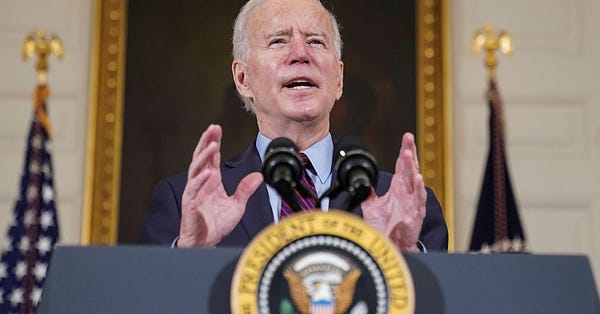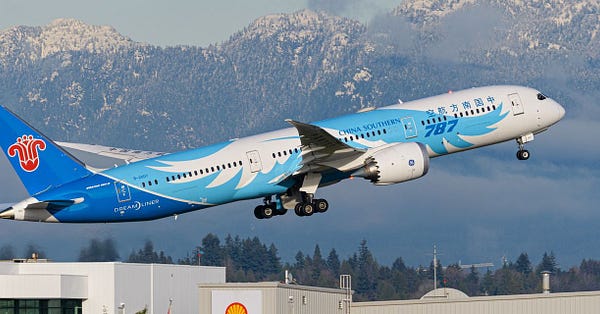Welcome to this week’s Trade War, the 56th edition. Based on previous public speeches and writing, Biden’s team is expected to take a tough approach to China. The latest possible picks for the U.S. ambassador to be posted to Beijing include former Chicago Mayor Rahm Emanuel and career diplomat Nicholas Burns.
Meanwhile, Biden has ordered his administration to do a review of critical supply chains, including semiconductors and rare earths, while a new report predicts hefty costs including job losses, from decoupling with China. And as a U.S. official asks Taiwan for help on the automotive chips shortage, concern is rising that China could take military action against the island.
Biden team’s tough tone on China
Will Biden’s team be tough on China? Judging from past speeches and writings the answer is yes, report Bloomberg News reporters Nicholas Wadhams and Jenny Leonard.
A report co-written by Melanie Hart, a former Center for American Progress senior fellow who will will be a Biden China policy coordinator, was critical of Chinese state subsidies supporting Huawei, and called for the use of countervailing subsidies to support companies from the U.S. and its allies.
Meanwhile, the China team also includes Ely Ratner at the Pentagon and Elizabeth Rosenberg at Treasury. Both were at the Center for a New American Security where they were part of a team that wrote a report calling for the creation of an “international consortium," including Japan and the Netherlands, to produce semiconductors to broaden the global supply chain, according to Bloomberg.

Amb. to China: political ties or diplomatic experience?
Early rumors that Pete Buttigieg or even Disney’s Bob Iger were candidates for U.S ambassador to China went nowhere.
Now Bloomberg News reporters Peter Martin and Jennifer Jacobs are reporting that former Chicago mayor Rahm Emanuel and former Under Secretary of State for Political Affairs Nicholas Burns are leading candidates for the job, citing “a person familiar with the matter.”
“The Biden administration is looking for someone with deep political ties or diplomatic experience for the crucial posting, according to the person, who asked not to be identified discussing the internal deliberations,” they report.

Supply chain checkup: chips, batteries and rare earths
President Biden will order his administration to carry out a review of critical supply chains including semiconductors, high capacity batteries and rare earth metals, reports CNBC.
The Biden team review will analyze the “resiliency and capacity of the American manufacturing supply chains and defense industrial base to support national security [and] emergency preparedness,” says a draft of an executive order seen by CNBC.
Without mentioning China by name, the draft says the review will examine supply chains that are reliant on “nations that are or are likely to become unfriendly or unstable.”
The Financial Times reported earlier in the week that China is considering a ban on rare earths sales to the U.S., aimed at punishing its defense industry, while Bloomberg reported the ban was being considered on U.S. companies for arms-related sales to Taiwan, including Lockheed Martin.


The costs of decoupling: aircraft and semiconductors
Decoupling from China would have a huge and damaging impact on the U.S. economy, according to a new report by the American Chamber of Commerce and consultancy the Rhodium Group.
“Full decoupling—meaning a complete cutoff of sales to China—would cost the U.S. aircraft and aviation industry between $38 billion and $51 billion in sales annually, the report estimates. That would translate to between 167,000 and 225,000 jobs lost,” writes the Wall Street Journal’s Bob Davis.
A halt of U.S. semiconductor sales to China would lead to $83 billion in lost revenues and 124,000 lost jobs, says the 88-page report entitled “Understanding U.S.-China Decoupling.”


Doing business: Oracle and the Chinese police
American business computing giant Oracle has marketed its data analytics software to police and security contractors across China, reports The Intercept’s Mara Hvistendahl, in an extensive investigation.
As well as apparently selling its services to at least two provinces, “Oracle also boasted that its data security services were used by other Chinese police entities, according to the documents — including police in Xinjiang, the site of a genocide against Muslim Uyghurs and other ethnic groups,” The Intercept reports.
“Companies should not be selling any kind of surveillance predictive policing system to the Ministry of Public Security,” Maya Wang, a China researcher for Human Rights Watch told The Intercept. “This raises questions about the role that the West has played in inspiring and building surveillance systems in China.”


U.S. official courts Taiwan on chips shortage
Meanwhile, a top Biden advisor is asking the Taiwanese government for help dealing with the global semiconductor shortage that has hit U.S. auto factories, reports Bloomberg News.
In a letter, Biden economic adviser, Brian Deese, wrote to Taiwan’s minister of economic affairs, Wang Mei-hua, thanking her for help addressing the chip shortage while raising the concerns of U.S. auto companies who have faced manufacturing delays.
“Leaders across the globe are realizing just how dependent they’ve become on the island democracy of Taiwan, which is being courted for its capacity to make leading-edge computer chips,” writes Bloomberg.

Taiwan conquest sacred national mission for Xi
The possibility of a war between China and Taiwan is rising, warns the Economist’ David Rennie.
“America’s ability to deter an invasion over Taiwan is crumbling. The main reason is China’s single-minded pursuit, over 20 years, of the advanced weapons and skills needed to keep American forces at bay. Another is Mr Xi’s sense of historical destiny, and his use of populist nationalism to bolster his authority,” Rennie writes.
“To many Chinese, Taiwan’s recovery is not just a sacred national mission. Its fulfillment would also signal that American global leadership is coming to an end. If China ever believes it can complete the task at a bearable cost, it will act.”


What US allies in a Taiwan war?
Few countries are likely to join the U.S. in a conflict with China over Taiwan, write former Pentagon and White House official Zach Cooper and national security scholar Sheena Greitens in a recent paper (pdf, pg. 16)
“If a major contingency erupts between China and the United States over Taiwan, Washington will find its large number of regional allies and partners reduced to a handful of willing contributors, and even those may place significant restraints on the use of their forces or U.S. access to their bases,” Cooper and Greitens write. “It is critical that the United States carefully balance the need to communicate a reliable deterrent with the necessity of avoiding unnecessary provocation.”
“But this delicate balance would be easier if Washington is able to come to agreement with Tokyo, Canberra, Seoul, and other allies and partners before a crisis, and if some baseline expectations of allied and partner responses can be clearly signaled.”


Better looking GDP or the people’s satisfaction?
China is facing a GDP ‘paradox,’ with young Chinese worrying about their future prospects despite fast economic growth, reports the South China Morning Post’s Cissy Zhou.
“Young Chinese are using social media platforms like Bilibili to voice despair over rising house prices, widening inequality and the price of everyday goods. The growing frustration about social mobility highlights a ‘serious divergence’ between China’s fast-growing economy and the life satisfaction of citizens,” Zhou writes.
“The labor share of China’s national income – the amount of GDP paid out in wages, salaries, and benefits,” fell from 51.4 percent in 1995 to around 40 percent over the past few years, the report says, citing research by Hao Qi at the School of Economics at Renmin University; that compares to a share in advanced economies of 50.5 percent in 2014, down from 54 percent in 1980.
“The figures highlight that investment returns are being concentrated in the hands of a few, and most workers are getting a lower share of GDP growth than those in developed countries,” the Post quotes Xi Xican, an economics professor at Fudan University, saying. “What is the ultimate purpose of our economic development? Is it for better looking GDP figures, or is it for people’s sense of access and satisfaction?”


Notable/In Depth
Concerns about the powerful elite that stood to benefit from the massive Ant Group IPO was part of Xi Jinping’s decision to block it, reports the Wall Street Journal’s Lingling Wei.


How the role of Chinese state enterprises has changed and where it is evolving is examined in this fascinating podcast with CSIS chair Jude Blanchette and Trivium China’s Andrew Polk interviewing Chinese economy expert Barry Naughton.
While the proportion of the Chinese economy produced by state-owned enterprises has not changed much over the last 25 years (some 25-30 percent of GDP), the political environment for private and state firms has. “These days, both types of companies are expected to follow the government’s guidance more closely,” writes Andrew Batson in a recent blog.
“The old capital swarms with officials, the concessions with businessmen,” wrote famed Chinese writer Lun Xun many years ago, expressing the eternal debate over how Beijing and Shanghai differ.
What the narrative on Chinese growth gets wrong
Discussed my book “The Myth of Chinese Capitalism” and what the standard narrative on Chinese economic growth gets wrong - with Nicholas Gordon in the Asian Review of Book podcast.

Mountain walk
Some pictures from a recent mountain walk.







